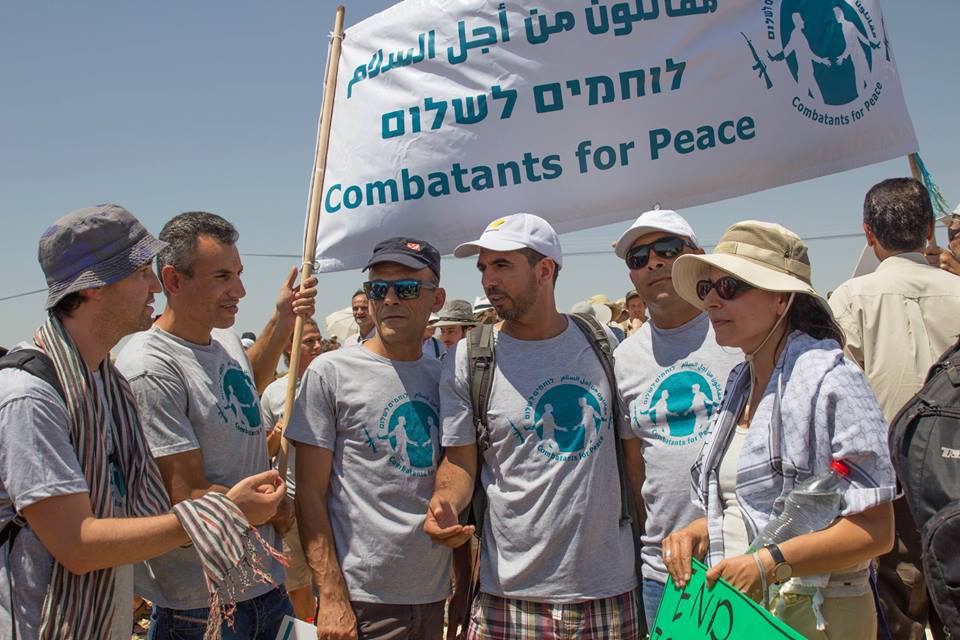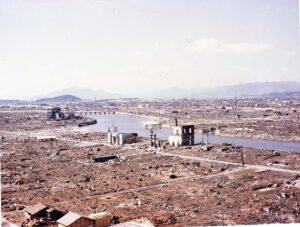Starving the body to feed the cause
By Khaled Diab
Hunger striking in prison taught Sulaiman Khatib a lot about his body, his mind and the importance of peaceful, non-violent activism.

Wednesday 29 July 2015
Sulaiman Khatib was only 12 when he started throwing rocks at Israeli soldiers in protest against the occupation. This was a couple of years before the image of the Palestinian rock thrower became the iconic emblem of the first intifada.
When Sulaiman was 14, he was involved in the stabbing of an Israeli soldier, for which he received a stiff sentence in 1986. “I was sentenced to 15 years imprisonment when I was 15,” he tells me some three decades later, at a trendy Ramallah coffee shop. “It was like a joke in prison. The oldest in my group was 18 – they sentenced him to 18 years.”
The reality of prison was harsh and a shock to the system for the young inmate who describes conditions in the juvenile wing as worse than for the adults. Pretty soon Sulaiman found himself becoming involved in a new form of protest, hunger strikes.
“In jail, there was nothing for free,” he points out. “So we had to engage in non-violent activities, such as hunger striking, so that we could improve our daily conditions.”
Given their serious consequences on the prisoners' health and bodies, hunger strikes were not entered into lightly by the prisoners. First, they would try other means, like sending back meals or entering into mini-hunger strikes. When these failed, the prisoners would escalate to an all-out, open-ended hunger strike.
Risky enterprise
Hunger strikes have an enormous debilitating effect on the body. At first, hunger pangs are overpowering but these usually disappear within three days. At around this time, when fat reserves have been used up, the body begins to muscle protein to make glucose to maintain metabolism.
After a fortnight, the body is severely weakened, leading to, among other things, difficulty standing up, dizziness, low heart rate and the chills. Low Vitamin B1 levels can also lead to neurological problems, including lack of motor skills and vision loss.
The risk of death relates to the type of hunger strike and the healthiness of the striker. If a person refuses all liquids, death is possible within two weeks. People with health problems can die in as little as three weeks even if they are consuming liquids.
Even with liquids, a healthy person will suffer severe complications within 45 days, at which point it becomes difficult even to swallow liquids and death is at the door at any moment.
Hunger strikes were a gruelling ordeal on the inmates' bodies and minds. “You get hungry, of course, it's not easy,” admits Suleiman. “There's a rule for hunger strikers: you're not allowed to talk about food,” he notes, quite sensibly.
However, though the spirit is willing, the flesh is weak. “For the first couple of hours we talk about food… During a hunger strike, even the most disgusting prison food which you used to throw away becomes attractive.”
As anyone who has fasted can attest, a hunger striker's sense of smell becomes acute and every aroma is delicious. “Food controls your thoughts and dreams,” he adds. Fully aware of this reality, the guards would sometimes try to break their resolve by ordering in food and eating it in front of the hunger-striking inmates.
“But you can't give in,” insists Suleiman. But how do you steel yourself against your most basic instincts and such overwhelming thoughts?
Through a form of secular ego death, Suleiman maintains. “It's not about you, the individual. In those days of revolution, you didn't say ‘I', you said ‘We.'”
This leads to subsumption of the self into the whole. “[This] creates a wonderful and profound solidarity. You become one with the group,” Suleiman observes. “Your ego and your person become less significant compared with the cause – the cause is more sacred and important,” he adds, though he is quick to point out that the prisoners back then were not in the least religious.
Suleiman also notes that the moral support of family, friends and the public on the outside is essential. “Without the small uprisings and solidarity outside the prison walls, a hunger strike is bound to fail,” he insists.
One paradoxical effect of a hunger strike, explains Suleiman and a fellow former hunger striker who has joined us, is that, though it debilitates your body, it gives you a profound sense of power. “We felt that we weren't ordinary people,” interjected Bassam. “You discover that you have abilities that you didn't know you possessed.”
This sense of power resonates to the present. “To this day, it gives me inner strength and fortitude,” Suleiman emphasises.
Hunger-striking and his time in prison also put Suleiman on the path to discovering an alternative route. “Prison opens the way for you to think differently,” he says. “You read a lot about different things, you reflect and this affects the way you think and feel.”
“Before I knew about Gandhi or Mandela,” Suleiman continues, “I learnt with the other prisoners that non-violence works because most of our hunger strikes succeeded.”
Today, Suleiman is a veteran peace activist and co-founder of Combatants for Peace, a grassroots group of ex-Israeli and Palestinian fighters who have decided to lay down their arms because they believe that there can be no violent resolution to the conflict.
A brief history of hunger strikes
Palestinian hunger strikes have a decades-long history. According to various sources, perhaps the earliest open-ended hunger strike took place at Ramle prison in 1969, and lasted for 10 days.
According to Suleiman Khatib, the largest ever hunger strike, which he participated in, took place in 1992. This particular hunger strike, which lasted 15 days, extended to almost every Israeli prison holding Palestinian political prisoners and involved a total of some 7,000 inmates.
Getting such a major endeavour successfully off the ground was no mean logistical feat. It required careful organisation and coordination within and between prisons. Sulaiman describes how messages were carefully scrawled by the best calligraphers on to tiny slips of paper, which were rolled up with tape into sealed capsules. At first, these were simply secreted in the mouth, but as prison authorities became more vigilant, they were often swallowed and fished out of the latrine later.
In addition, in an admirable show of democracy, prisoners put everything to the vote. “We had an elected spokesman. You could criticise any of the elected representatives to their face. There was better democracy than outside,” Suleiman explains. “The Israeli minister of police at the time said that the only liberated part of this country were the prisons.”
Today, hunger strikes are still common, and have evolved not just to oppose prison conditions but also as a political protest against individual sentences or the arbitrary practice of so-called “administrative detentions”.


